Questões Militares
Comentadas para aeronáutica
Foram encontradas 10.100 questões
Resolva questões gratuitamente!
Junte-se a mais de 4 milhões de concurseiros!
Na questão de Física, quando necessário, utilize:
• aceleração da gravidade: g = 10 m/s2
• cos 30º = sen 60º = √3/2
• cos 60º = sen 30º = 1/2
• condutividade térmica do vidro: K = 0,8 W/(m·K)
• 1 atm = 1,0·105 N/m2
• constante universal dos gases: R = 8,0 J/(mol·K)
• 1 L = 1 dm3
• 1 cal = 4 J
• calor específico da água: c = 1 cal/(g·ºC)
• velocidade da luz no vácuo: c = 3 x 108 m/s
• constante de Planck: h = 6,6 x 10-34 J∙s
• carga elementar (e) = 1,6 x 10-19 C
• 1 Å = 10-10 m
Dois blocos, A e B, de dimensões desprezíveis são abandonados, partindo do repouso, do topo de um plano inclinado de 30º em relação à horizontal; percorrendo, depois de um mesmo intervalo de tempo, as distâncias indicadas conforme ilustra a figura seguinte.
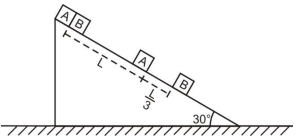
Sejam µA e µB, os coeficientes de atrito cinético entre a
superfície do plano inclinado e os blocos A e B,
respectivamente. Considerando μA
= 2μB
, então μB
vale
Na questão de Física, quando necessário, utilize:
• aceleração da gravidade: g = 10 m/s2
• cos 30º = sen 60º = √3/2
• cos 60º = sen 30º = 1/2
• condutividade térmica do vidro: K = 0,8 W/(m·K)
• 1 atm = 1,0·105 N/m2
• constante universal dos gases: R = 8,0 J/(mol·K)
• 1 L = 1 dm3
• 1 cal = 4 J
• calor específico da água: c = 1 cal/(g·ºC)
• velocidade da luz no vácuo: c = 3 x 108 m/s
• constante de Planck: h = 6,6 x 10-34 J∙s
• carga elementar (e) = 1,6 x 10-19 C
• 1 Å = 10-10 m
Foram apresentados a um aluno de física, os seguintes gráficos representativos de movimentos retilíneos.
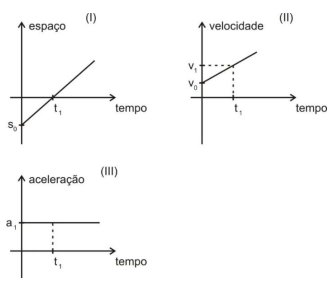
Ao analisar os gráficos o aluno percebeu que podem
representar um mesmo movimento, os gráficos
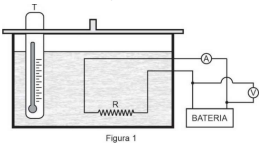
Com a temperatura θ lida no termômetro T, obteve-se, em função do tempo de aquecimento Δt, o gráfico representado na Figura 2.
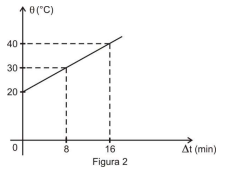
2ª etapa: repete-se a experiência, desde o início, desta vez, colocando o objeto de material desconhecido imerso na água. Sem alterar a quantidade de água, a corrente e a tensão no circuito elétrico, obteve-se o gráfico representado na Figura 3.
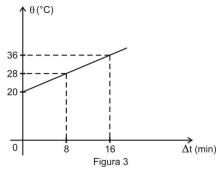
Considerando que, em ambas as etapas, toda energia elétrica foi dissipada por efeito Joule no resistor R, pode-se concluir que o calor específico do material de que é feito o objeto é, em cal/(g∙°C) igual a
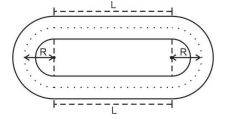
Em sua primeira volta, o candidato percorre os trechos semicirculares com velocidade constante v e os trechos retilíneos com velocidade constante 3/2 v. Além disso, sua velocidade escalar média, nessa primeira volta, foi igual a 6/5 v . Nessas condições, o trecho retilíneo L dessa pista tem comprimento, em m, igual a
O youtuber e Machado de Assis, ou uma polêmica bem-vinda
Cláudia Costin*
1§ Uma polêmica apareceu nos últimos dias, nas redes sociais, a partir de um comentário do youtuber Felipe Neto, sobre a atitude de escolas que tornam as obras de Machado de Assis obrigatórias. Segundo ele, o que estas deveriam promover seria a leitura por prazer, de forma a constituir, nas jovens mentes, o hábito de ler como uma atividade para toda a vida.
2§ Devo me confessar uma grande admiradora de Machado de Assis, um de nossos maiores escritores, um homem à frente de sua época, crítico de valores associados a aparências e à superficialidade humana na busca de status e do bacharelismo vigente. Mas entendi que nem sempre a linguagem do século 19 pode ser fácil para os adolescentes deste tempo de informações imediatas e superficiais.
3§ Num contexto em que adultos letrados leem muito pouco e não são vistos lendo livros por seus filhos, é compreensível que os jovens não percam tempo lendo outra coisa que não o que a escola lhes exige. A última edição da pesquisa Retratos da Leitura coloca-nos claramente como um país de não leitores. A média de livros lidos entre os entrevistados por ano é de 4,95 e só 2,55 deles lidos por inteiro.
4§ Cabe sim à escola fomentar a leitura por prazer, oferecendo livros que atraiam o interesse das novas gerações. Em tempos em que o trabalho humano, inclusive o que demanda habilidades mentais, vem sendo substituído por algoritmos, formar pensadores independentes, com um repertório cultural variado, aptos a entender a cultura de seu tempo e sua gênese, torna-se uma prioridade.
5§ E a literatura nos ajuda a entender não só fatos pretéritos, mas as análises que, a cada época, eram feitas sobre a organização da sociedade. Machado, nesse sentido, é fundamental e merece, dia a dia, uma introdução à altura, instigante e engajadora, feita por bons professores, que orientem os alunos na leitura de suas obras e os ajudem a nelas navegar com profundidade e prazer estético.
* Diretora do Centro de Excelência e Inovação em Políticas Educacionais, da FGV, e ex-diretora de educação do Banco Mundial. Folha de S. Paulo, Opinião, 29 jan. 2021, p. A2. Adaptado.
Observe o cartaz a seguir.

Disponível em:<https://www.youtube.com/watch?v=YSB24kjvF_g> .
Acesso em: 26 fev. 2021.
A respeito do processo de elaboração do texto verbal e não verbal do cartaz, e considerando, ainda, sua relação com o artigo “O youtuber e Machado de Assis, ou uma polêmica bem-vinda”, avalie o que se afirma a seguir.
I. O verbo “cancelar” foi empregado com uma nova acepção.
II. O texto está em dissintonia com uma das discussões propostas no artigo.
III. O fato que deu origem ao cartaz refere-se a um acontecimento midiático.
IV. O diálogo com o texto de Cláudia Costin se realiza, mas sem fornecer pistas.
Notações
ℕ = {1, 2, 3, . . . }: o conjunto dos números naturais.
ℝ : o conjunto dos números reais.
ℂ : o conjunto dos números complexos.
i : unidade imaginária, i2 = −1.
: segmento de reta de extremidades nos pontos A e B.
: ângulo formado pelos segmentos
e
, com vértice no ponto O.
m() : medida do segmento
.
Observação: Os sistemas de coordenadas considerados são os cartesianos retangulares.
Seja ABCD um quadrilátero convexo com diagonais  e
e  Considere as afirmações:
Considere as afirmações:
I. Se as diagonais  e
e  têm mesmo comprimento e se intersectam ortogonalmente, então ABCD é
um losango.
têm mesmo comprimento e se intersectam ortogonalmente, então ABCD é
um losango.
II. Se as diagonais  e
e  dividem o quadrilátero ABCD em quatro triângulos de mesma área, então
ABCD é um paralelogramo.
dividem o quadrilátero ABCD em quatro triângulos de mesma área, então
ABCD é um paralelogramo.
III. Se o ponto de interseção das diagonais  e
e  é o centro do círculo que circunscreve o quadrilátero
ABCD, então ABCD é um retângulo.
é o centro do círculo que circunscreve o quadrilátero
ABCD, então ABCD é um retângulo.
É(são) VERDADEIRA(S):
Notações
ℕ = {1, 2, 3, . . . }: o conjunto dos números naturais.
ℝ : o conjunto dos números reais.
ℂ : o conjunto dos números complexos.
i : unidade imaginária, i2 = −1.
: segmento de reta de extremidades nos pontos A e B.
: ângulo formado pelos segmentos
e
, com vértice no ponto O.
m() : medida do segmento
.
Observação: Os sistemas de coordenadas considerados são os cartesianos retangulares.
A questão refere-se ao texto destacado a seguir.
It is the standing reproach of a democratic society that it is the purgatory of genius and the paradise of mediocrity. With ourselves it has become notorious that when a man is so unfortunate as to exhibit uncommon abilities, he usually renders himself ineligible for political honors or distinctions. It would seem that the community is possessed with that groveling quality of a sordid mind which hates superiority, and would ostracize genius, as the Athenians did Aristides. One might believe it would not be unpleasing to the popular taste if some enterprising person could invent a machine for stunting intellectual development, after the fashion of idiotic barbarians who flatten the heads of their children. The masses of the community certainly appear to believe that political equality implies not only social, but should also imply intellectual equality, under pain of being severely frowned down by an outraged public opinion.
The prevalent sentiment manifests itself in many different ways. It finds expression in public conveyances and resorts and is not altogether unknown even to the pulpit. It is found to perfection in the speeches of demagogues, who feel certain they are never so successful as when their audience is satisfied that the intellect of the speaker is of no higher an order than that of the lowest intelligence among them. Worse than all, it is demonstrated in the election of public officers of nearly all grades up to the highest: of which latter it has now become quite the custom to assume that it is impossible for a man of first-rate powers to be made President of the United States.
The causes which lend to so singular a state of affairs are of an intricate and complex character. At the outset, it is difficult to realize the possibility of a system, the logical deduction from which appears to be that, if a man would rise in life, he must assiduously belittle his understanding. Perhaps it would be fairer to modify the proposition so far as to concede that ability is as useful here as elsewhere, provided the owner has the tact not to affront the sensibilities of the people by showing too much of it. No doubt a vague apprehension exists in the popular mind that shining talents are dangerous when intrusted with executive power in a republic: yet, it were a poor commentary on our institutions to intimate that, under them, for a man to be clever he must also be vicious. Experience rather teaches the contrary. If the diffusion of education, having the general tendency to elevate the understanding, is to produce more bad men than good, we had better abandon than foster our Common School system. Manifestly, we must look further for the solution of our enigma[:] that minds of moderate calibre ordinarily condemn everything which is beyond their range.
THE NEW YORK TIMES. The worship of mediocrity. 17/08/1862.
Disponível em: https://www.nytimes.com/1862/08/17/archives/the-worship-of-mediocrity.html. Acesso 20/08/2020.
A questão refere-se ao texto destacado a seguir.
It is the standing reproach of a democratic society that it is the purgatory of genius and the paradise of mediocrity. With ourselves it has become notorious that when a man is so unfortunate as to exhibit uncommon abilities, he usually renders himself ineligible for political honors or distinctions. It would seem that the community is possessed with that groveling quality of a sordid mind which hates superiority, and would ostracize genius, as the Athenians did Aristides. One might believe it would not be unpleasing to the popular taste if some enterprising person could invent a machine for stunting intellectual development, after the fashion of idiotic barbarians who flatten the heads of their children. The masses of the community certainly appear to believe that political equality implies not only social, but should also imply intellectual equality, under pain of being severely frowned down by an outraged public opinion.
The prevalent sentiment manifests itself in many different ways. It finds expression in public conveyances and resorts and is not altogether unknown even to the pulpit. It is found to perfection in the speeches of demagogues, who feel certain they are never so successful as when their audience is satisfied that the intellect of the speaker is of no higher an order than that of the lowest intelligence among them. Worse than all, it is demonstrated in the election of public officers of nearly all grades up to the highest: of which latter it has now become quite the custom to assume that it is impossible for a man of first-rate powers to be made President of the United States.
The causes which lend to so singular a state of affairs are of an intricate and complex character. At the outset, it is difficult to realize the possibility of a system, the logical deduction from which appears to be that, if a man would rise in life, he must assiduously belittle his understanding. Perhaps it would be fairer to modify the proposition so far as to concede that ability is as useful here as elsewhere, provided the owner has the tact not to affront the sensibilities of the people by showing too much of it. No doubt a vague apprehension exists in the popular mind that shining talents are dangerous when intrusted with executive power in a republic: yet, it were a poor commentary on our institutions to intimate that, under them, for a man to be clever he must also be vicious. Experience rather teaches the contrary. If the diffusion of education, having the general tendency to elevate the understanding, is to produce more bad men than good, we had better abandon than foster our Common School system. Manifestly, we must look further for the solution of our enigma[:] that minds of moderate calibre ordinarily condemn everything which is beyond their range.
THE NEW YORK TIMES. The worship of mediocrity. 17/08/1862.
Disponível em: https://www.nytimes.com/1862/08/17/archives/the-worship-of-mediocrity.html. Acesso 20/08/2020.
A questão refere-se ao texto destacado a seguir.
It is the standing reproach of a democratic society that it is the purgatory of genius and the paradise of mediocrity. With ourselves it has become notorious that when a man is so unfortunate as to exhibit uncommon abilities, he usually renders himself ineligible for political honors or distinctions. It would seem that the community is possessed with that groveling quality of a sordid mind which hates superiority, and would ostracize genius, as the Athenians did Aristides. One might believe it would not be unpleasing to the popular taste if some enterprising person could invent a machine for stunting intellectual development, after the fashion of idiotic barbarians who flatten the heads of their children. The masses of the community certainly appear to believe that political equality implies not only social, but should also imply intellectual equality, under pain of being severely frowned down by an outraged public opinion.
The prevalent sentiment manifests itself in many different ways. It finds expression in public conveyances and resorts and is not altogether unknown even to the pulpit. It is found to perfection in the speeches of demagogues, who feel certain they are never so successful as when their audience is satisfied that the intellect of the speaker is of no higher an order than that of the lowest intelligence among them. Worse than all, it is demonstrated in the election of public officers of nearly all grades up to the highest: of which latter it has now become quite the custom to assume that it is impossible for a man of first-rate powers to be made President of the United States.
The causes which lend to so singular a state of affairs are of an intricate and complex character. At the outset, it is difficult to realize the possibility of a system, the logical deduction from which appears to be that, if a man would rise in life, he must assiduously belittle his understanding. Perhaps it would be fairer to modify the proposition so far as to concede that ability is as useful here as elsewhere, provided the owner has the tact not to affront the sensibilities of the people by showing too much of it. No doubt a vague apprehension exists in the popular mind that shining talents are dangerous when intrusted with executive power in a republic: yet, it were a poor commentary on our institutions to intimate that, under them, for a man to be clever he must also be vicious. Experience rather teaches the contrary. If the diffusion of education, having the general tendency to elevate the understanding, is to produce more bad men than good, we had better abandon than foster our Common School system. Manifestly, we must look further for the solution of our enigma[:] that minds of moderate calibre ordinarily condemn everything which is beyond their range.
THE NEW YORK TIMES. The worship of mediocrity. 17/08/1862.
Disponível em: https://www.nytimes.com/1862/08/17/archives/the-worship-of-mediocrity.html. Acesso 20/08/2020.
I. Quanto menos inteligente for um homem, mais chances ele terá de ser presidente dos Estados Unidos. II. Quando um homem é infeliz a ponto de exibir habilidades incomuns, ele se torna inelegível para distinções políticas. III. A declaração de que o sistema educacional deve ser abandonado se produz mais pessoas ruins que boas é irônica.
De acordo com o texto, é correto afirmar que:
A questão refere-se ao texto destacado a seguir.
Since from August 1914 to November 1918 Great Britain and her Allies were fighting for civilization it cannot, I suppose, be impertinent to inquire what precisely civilization may be. “Liberty” and “Justice” have always been reckoned expensive words, but that “Civilization” could cost as much as I forget how many millions a day came as a surprise to many thoughtful taxpayers. The story of this word’s rise to the highest place amongst British war aims is so curious that, even were it less relevant, I should be tempted to tell it […].
“You are fighting for civilization”, cried the wisest and best of those leaders who led us into war, and the very soldiers took up the cry, “Join up, for civilization’s sake”. Startled by this sudden enthusiasm for an abstraction in which till then politicians and recruiting-sergeants had manifested little or no interest, I, in my turn, began to cry: “And what is civilization?” I did not cry aloud, be sure: at that time, for crying things of that sort aloud, one was sent to prison. But now that it is no longer criminal, nor unpatriotic even, to ask questions, I intend to inquire what this thing is for which we fought and for which we pay. I propose to investigate the nature of our leading war-aim. Whether my search will end in discovery and – if it does – whether what is discovered will bear any likeliness to the Treaty of Versailles remains to be seen.
BELL, Clive. Civilization: An Essay. 1ª ed. 1928. Harmondsworth,
Middlesex, UK: Penguin Books, 1938, p. 13.
A questão refere-se ao texto destacado a seguir.
Since from August 1914 to November 1918 Great Britain and her Allies were fighting for civilization it cannot, I suppose, be impertinent to inquire what precisely civilization may be. “Liberty” and “Justice” have always been reckoned expensive words, but that “Civilization” could cost as much as I forget how many millions a day came as a surprise to many thoughtful taxpayers. The story of this word’s rise to the highest place amongst British war aims is so curious that, even were it less relevant, I should be tempted to tell it […].
“You are fighting for civilization”, cried the wisest and best of those leaders who led us into war, and the very soldiers took up the cry, “Join up, for civilization’s sake”. Startled by this sudden enthusiasm for an abstraction in which till then politicians and recruiting-sergeants had manifested little or no interest, I, in my turn, began to cry: “And what is civilization?” I did not cry aloud, be sure: at that time, for crying things of that sort aloud, one was sent to prison. But now that it is no longer criminal, nor unpatriotic even, to ask questions, I intend to inquire what this thing is for which we fought and for which we pay. I propose to investigate the nature of our leading war-aim. Whether my search will end in discovery and – if it does – whether what is discovered will bear any likeliness to the Treaty of Versailles remains to be seen.
BELL, Clive. Civilization: An Essay. 1ª ed. 1928. Harmondsworth,
Middlesex, UK: Penguin Books, 1938, p. 13.
Assinale a alternativa correta relativamente ao grifo do pronome demonstrativo e o uso da pontuação.
Quando precisar use os seguintes valores para as constantes:
Aceleração local da gravidade g = 10 m/s2 .
Constante gravitacional universal G = 6,67×10−11 m3 .kg−1.s−2 .
Velocidade da luz no vácuo c = 3,0×108 m/s.
Constante de Planck reduzida h = 1,05×10−34 J.s.
Permeabilidade magnética do vácuo µ0 = 4π×10−7 N.A−2 .
Carga elétrica elementar e = 1,6×10−19C.
Massa do elétron m0 = 9,1×10−31 kg.
Constante eletrostática do vácuo K0 = 9,0×109 N.m2.C-2.
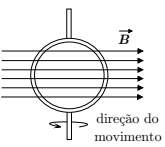
Quando precisar use os seguintes valores para as constantes:
Aceleração local da gravidade g = 10 m/s2 .
Constante gravitacional universal G = 6,67×10−11 m3 .kg−1.s−2 .
Velocidade da luz no vácuo c = 3,0×108 m/s.
Constante de Planck reduzida h = 1,05×10−34 J.s.
Permeabilidade magnética do vácuo µ0 = 4π×10−7 N.A−2 .
Carga elétrica elementar e = 1,6×10−19C.
Massa do elétron m0 = 9,1×10−31 kg.
Constante eletrostática do vácuo K0 = 9,0×109 N.m2.C-2.
 como função da coordenada radial r a partir do eixo de simetria do sistema?
como função da coordenada radial r a partir do eixo de simetria do sistema? Quando precisar use os seguintes valores para as constantes:
Aceleração local da gravidade g = 10 m/s2 .
Constante gravitacional universal G = 6,67×10−11 m3 .kg−1.s−2 .
Velocidade da luz no vácuo c = 3,0×108 m/s.
Constante de Planck reduzida h = 1,05×10−34 J.s.
Permeabilidade magnética do vácuo µ0 = 4π×10−7 N.A−2 .
Carga elétrica elementar e = 1,6×10−19C.
Massa do elétron m0 = 9,1×10−31 kg.
Constante eletrostática do vácuo K0 = 9,0×109 N.m2.C-2.
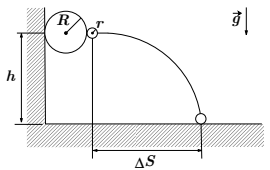
Preencha as lacunas tendo em vista uma das funções gerenciais em bibliotecas.
Desdobra-se o trabalho de ____________________ em três dimensões: preparo do plano de trabalho, acompanhamento das ações programadas e revisão crítica dos resultados obtidos. Enfatiza-se que essas três fases devem-se seguir necessariamente, dando o caráter que os teóricos gostam de ressaltar: _______________ é um processo ininterrupto.
A sequência que preenche corretamente as lacunas do texto é
Analise as asserções a seguir e a relação proposta entre elas.
I. A enciclopédia tem sido considerada a mais importante das obras de referência
PORQUE
II. ela provê os dados mais atualizados sobre assuntos diversos dispensando o leitor da leitura de outros
tipos de fonte de informação.
Sobre essas asserções, é correto afirmar que
Até o surgimento dos livros eletrônicos, o comércio dos livros era baseado em modelos de aquisição proprietária: compra, doação e permuta.
Nesses modelos a pessoa que adquire um livro impresso terá